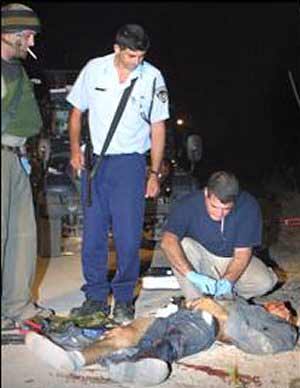The
army said it was checking claims the men were led away.
Other weekend violence included a missile attack by Israeli helicopters
that killed a militant and four civilians, a gunbattle that killed the
son of a local militant leader, and the shooting death of a Palestinian
who infiltrated a Jewish settlement in the West Bank, shooting and wounding
two Israelis.
MILITARY GETS SCRUTINY
The military operations
are part of an Israeli campaign against militants after Palestinian suicide
bombings in Israel that have killed hundreds. Israelis and Palestinians
are locked in a cycle of attacks and counterattacks that began in September
2000.
Israel has said the loss of civilian life is an unintended consequence
of its campaign to stop suicide bombings. But some are asking if there
has been a change in military policy giving soldiers more leeway when deciding
whether to shoot.
Palestinian Information Minister Yasser Abed Rabbo called for an end to
recent talks with the Israelis that have included a tentative agreement
envisioning Israeli pullbacks in the West Bank and Gaza in exchange for
Palestinian assurances against terror.
“After each meeting with the Israelis a new massacre happens somewhere
in the Palestinian territories,” he said.
Also Sunday, Israeli troops killed a Palestinian gunman in the West Bank
town of Jenin in a fierce gunbattle, the army and members of the militant
Islamic Jihad said. Abdel Kareem Sadi, 16, the son of Bassam Sadi, the
group’s Jenin district leader, was shot in the back, Islamic Jihad sources
said. Two other gunmen were wounded in the fighting that erupted when troops
entered a refugee camp early in the morning.
‘WE ARE NOT TRIGGER-HAPPY’
In the West Bank town of Tubas on Saturday, an Israeli helicopter fired
three missiles at a car, apparently targeting two militants from the Al-Aqsa
Brigades, a militia affiliated with Yasser Arafat’s Fatah movement. The
attack killed one of the militants, as well as two teens in the car and
a 10-year-old boy and 6-year-old boy walking nearby. Another militant in
the car was wounded as were six bystanders.
Palestinian Cabinet
minister Saeb Erekat called the strike a “brutal act of murder.”
Later Saturday, a Palestinian gunman infiltrated the Jewish settlement
of Har Bracha in the West Bank and wounded two Israelis, including a 23-year-old
pregnant woman, before being shot dead.
The weekend violence
came after Israeli tank fire killed four Palestinian civilians in the Gaza
Strip on Thursday — a mother, her two sons and an uncle.
Speaking at a ceremony at the foreign ministry, Foreign Minister Peres
insisted, “We are not trigger-happy.”
But Haim Ramon, a lawmaker from Peres’ center-left Labor party, said he
wants to know if there has been a change in the army’s rules of engagement
“in the direction of leniency toward the finger that squeezed the trigger.”
PAUSE IN BOMBINGS
Ramon said the killing
of innocent people threatens Israeli security because it “damages our international
standing” and “brings into the cycle of terrorism more people who did not
previously intend to join it.”
Prime Minister Ariel Sharon has made it clear he intends to use military
means to stop attacks on Israelis. But he heads a national unity government
comprising parties from both the left and right, and his defense minister,
Binyamin Ben-Eliezer, has been speaking to the Palestinians about Israeli
pullbacks.
After suicide attacks over the summer, the Israeli army reoccupied much
of the West Bank and parts of the Gaza Strip — imposing severe restrictions
that have further devastated the Palestinian economy and confined hundreds
of thousands of Palestinians to their homes for days at a time.
Israeli newspaper columnist Nahum Barnea wrote in the Yediot Ahronot daily
that the tentative contacts with the Palestinians should be given a chance
to bear fruit.
“What is the use of heating things up by means of proactive military operations?”
he wrote. “The Palestinians will respond with a wave of terror attacks.”
There have been no suicide bombings in Israel since Aug. 4.

|
